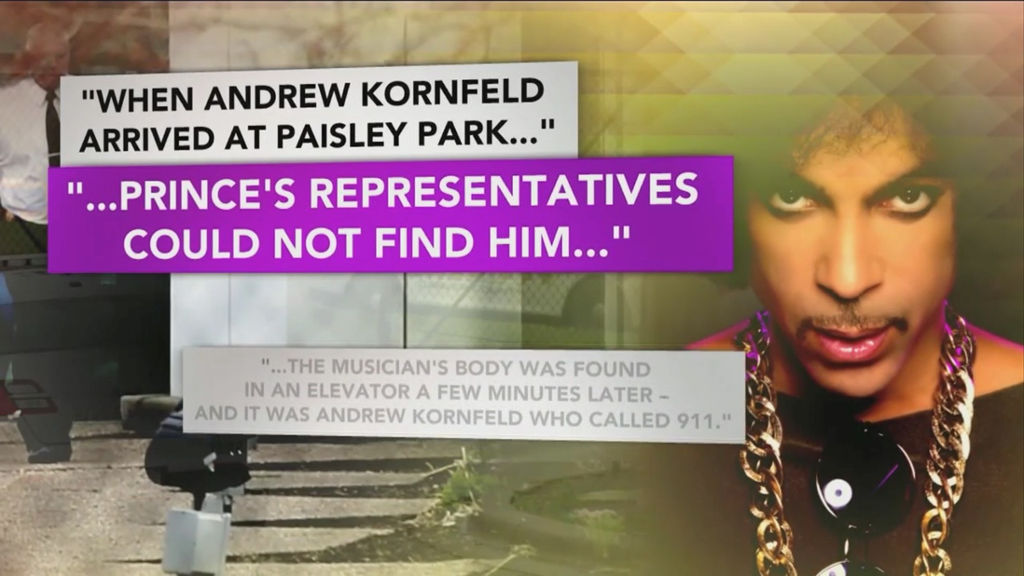
Pain Killers Killed Prince?

Current Events –
Pain Killers Killed Prince?
BREAKING NEWS: The Medical Examiner has just released news that the cause of death of Prince Rogers Nelson was the result of an overdose of pain killers.
What really happened to music icon Prince? New details have emerged regarding his death and probable addiction to prescription pain killers.
Current Events
The rock star was found dead last month inside an elevator at his Minnesota mansion. Autopsy and toxicology results have not yet been made public (and may never be), but the events surrounding his death appear to be more than just the result of a bad bout with the flu.

Prince’s body was found by Andrew Kornfeld, the son of Dr. Howard Kornfeld, a California pain and addiction specialist. The 26-year-old Kornfeld was dispatched to Prince’s Paisley Park home on a last-minute “life-saving mission,” when his physician father was unable to make the trip himself. Apparently, Prince’s staff contacted the doctor for a “grave medical intervention,” after the music star’s plane was forced to make an emergency landing in Moline, Illinois and he was rushed to a local hospital only days before his death.
Andrew Kornfeld arrived at Paisley Park on April 22nd carrying an urgent package: a bottle of buprenorphine, which is traditionally used to help people get off opioids. However, before Kornfeld could hand deliver the pills to Prince, he found him dead inside an elevator. It was in fact Kornfeld who made the call to 911 to summon paramedics to the scene.
Now, new details have emerged that Prince had been dead for more than 6 hours before he was discovered. Prescription opioid medication was also found on his body.

The U.S. Drug Enforcement Agency conducted a search of Prince’s Paisley Park compound, looking for evidence that multiple doctors may have supplied him with Percocet and other opiates without going through proper medical protocols. DEA officials are also looking into why Prince’s local physician, Dr. Michael Todd Schulenberg, suddenly abandoned his medical practice and closed up shop less than 3 weeks after the star’s death. Schulenberg was at Paisley Park on the day Prince died, but says he was only present to “drop off test results.”
Authorities are also investigating the California doctor and his son. The younger Kornfeld is neither a doctor nor certified to dispatch medicine. Further, Dr. Howard Kornfeld is not licensed in the State of Minnesota and is in violation of federal prescription laws for crossing state lines.
Dr. Kornfeld is well-known for a paper he published last year on the use of buprenorphine, which he says can be used to treat opioid addiction by easing cravings and withdrawal symptoms. He described using a buprenorphine patch to avoid “the painful abstinence period” before standard buprenorphine treatment for addiction. In a 2011 letter to a medical journal, he praised buprenorphine’s potential for pain patients, saying believers in opioid therapy “need not lose faith.”
Prince underwent hip replacement surgery in 2010, likely due to the extreme physical nature of his show. As he resumed his electrifying stage performances, he was given powerful pain killers to make it through each day. The opiates are easily addicting. Despite his extremely healthy lifestyle and eating regimen, Prince almost certainly fell victim to the comfort of the pain killers. This might explain why his plane was forced to land and he was rushed to a hospital only an hour after his final performance in Atlanta and less than 45 minutes away from landing in Minnesota. It may also explain why he was seen at multiple local pharmacies filling prescriptions during the days before his death.
More than a month has passed since Prince passed away, yet the autopsy reports still have not been released and no date for their release has been given. The autopsy and toxicology reports are expected to give definitive answers as to what killed the 57-year old megastar, as well as what was in his body at the time of death.
.







Honestly, as more and more info about Prince's addiction to opiates has come to light I've gone back and forth between anger and sadness.
That Prince, a man well known for his "extremely healthy lifestyle and eating regimen" was in actuality an opioid addict!?! Well, frankly, it makes me wannn holla because it smacks in the face of the person he presented himself to be.
And physicians who provide celebrities with "special" access to all kinds of dangeorus drugs are drug-dealers. End of story. They should be arrested, charged and prosecuted as such.
So then the sad truth is, given that Prince had been on opiates since at least 2010…maybe even longer….his life was lost to himself, and to us, long before he took his last breath.
I just read this from CNN and it is really true especially when it comes to drugs and they way they died.
Prince and Michael Jackson.
They were born the same year and rose to colossal fame in the 1980s. Each defined a sound for a generation. They were both committed musicians who helped to integrate the world of mainstream music videos.
Prince and Jackson were intensely private, almost otherworldly. They often retreated into their homes, which were really compounds that let them close off the world.
In life, their careers seemed to track, but rarely touch, one another. Were they friends? Not really. Were they rivals? Not really.
In death — Prince last month, Jackson in 2009 — the two are finally more closely linked in one way: Their deaths were shocking, untimely and tragic.
In death — Prince last month, Jackson in 2009 — the two are finally more closely linked in one way: Their deaths were shocking, untimely and tragic. […]
Your entire response is well said BD.
Sadly, Michael Jackson's death wasn't as suprising for me. In fact shortly before his death, I had just had a conversation with my cousin and expressed to her that I didn't think he was long for this world.
Prince's death, on the other hand, was completely different. I did NOT see that coming at all. And honestly, I still find it a little hard to believe that he really IS gone.